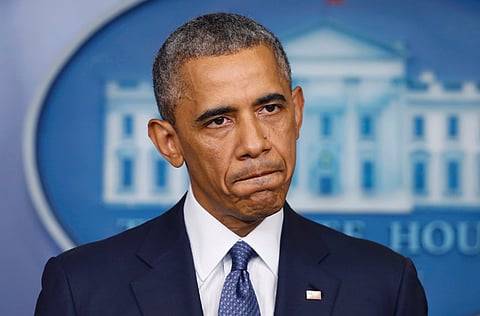Obama is not responsible for the chaos in Ukraine
The current situation is the result of an attempt to project Western institutions into the core of what Moscow perceives as its sphere of influence

The “illusion of retrospective determinism” is a somewhat pretentious sounding but nonetheless very important concept. Distilled down to its most basic level, it means that we should never assume that historical events needed to happen in a particular way. It might seem like the First World War had to start in August 1914 or that the Cold War had to end in the 1989, but it’s simply not true: There are all sorts of contingencies and decisions that could have caused very different outcomes.
It’s worth keeping this concept in mind when talking about “the reset”, US President Barack Obama’s ill-fated (and vastly over-hyped) policy to improve relations with Russia. Many people, particularly on the conservative side of the aisle, are once again excoriating Obama for his fecklessness and naïveté. These critics point to the shooting down of Malaysia Airlines Flight 17 as proof that any attempt to treat with the Russians was foolish and counterproductive. Many go even further. Popular columnist Victor Davis Hanson, argues (in a very long sentence!) that “the reset” wasn’t just a bad policy on its own merits, but it actually helped spark the current crisis in Ukraine:
[I]t seemed obvious from that the way that Secretary Clinton promoted reset that it would lead to worsening relations by undercutting Russians who had legitimate complaints about Putin’s thuggery and thereby would only further encourage his absolutism by our acquiescence green-lighting more Russian adventurism that could only in the future destabilise the former Soviet republics and lead to increased tensions with the US and Europe.
So we should blame the reset for what’s currently happening in Ukraine? Did Obama’s modest overtures to Moscow, which were almost purely rhetorical in nature, actually encourage violent revanchism?
No!
The proximate cause of the crisis in Ukraine was President Viktor Yanukovych’s refusal to sign an association agreement with the European Union. The agreement was absolutely not in any way an initiative of the Obama administration: It was first put on the radar at a summit in Paris in September 2008, before Obama was even elected president. The main driving force behind the development of the agreement was Eastern European countries like Poland, the Czech Republic and the Baltics. The United States didn’t oppose the agreement, it complemented traditional US policy in the region, but it was an agreement developed, supported and ultimately implemented by Europeans working through European institutions.
The current chaos in Ukraine, which the Russians have both encouraged and used to their advantage, has nothing to do with the START treaty, anti-terrorism cooperation or any of the other policy components of “the reset”. It instead has to do with the fact that the EU association agreement would have firmly anchored Ukraine in the Western camp and the related fact that the Russians will never accept this. Had Ukraine been left alone, had it continued to exist in the uneasy middle ground it had occupied since the collapse of the Soviet Union, there would be political tension but there would absolutely not be the kind of open warfare which is now raging in Donetsk and Lugansk oblasts.
It is still possible to oppose the reset: There are arguments to be made that a more confrontational American policy would have yielded results. But when making the case for a hawkish Russia policy, remember that the nightmare of present-day Ukraine comes not from an excessively weak and accommodating policy but from an attempt to project Western institutions into the core of what Moscow perceives as its sphere of influence.
–Washington Post
Mark Adomanis specialises in Russian economics and demographics.
Sign up for the Daily Briefing
Get the latest news and updates straight to your inbox



